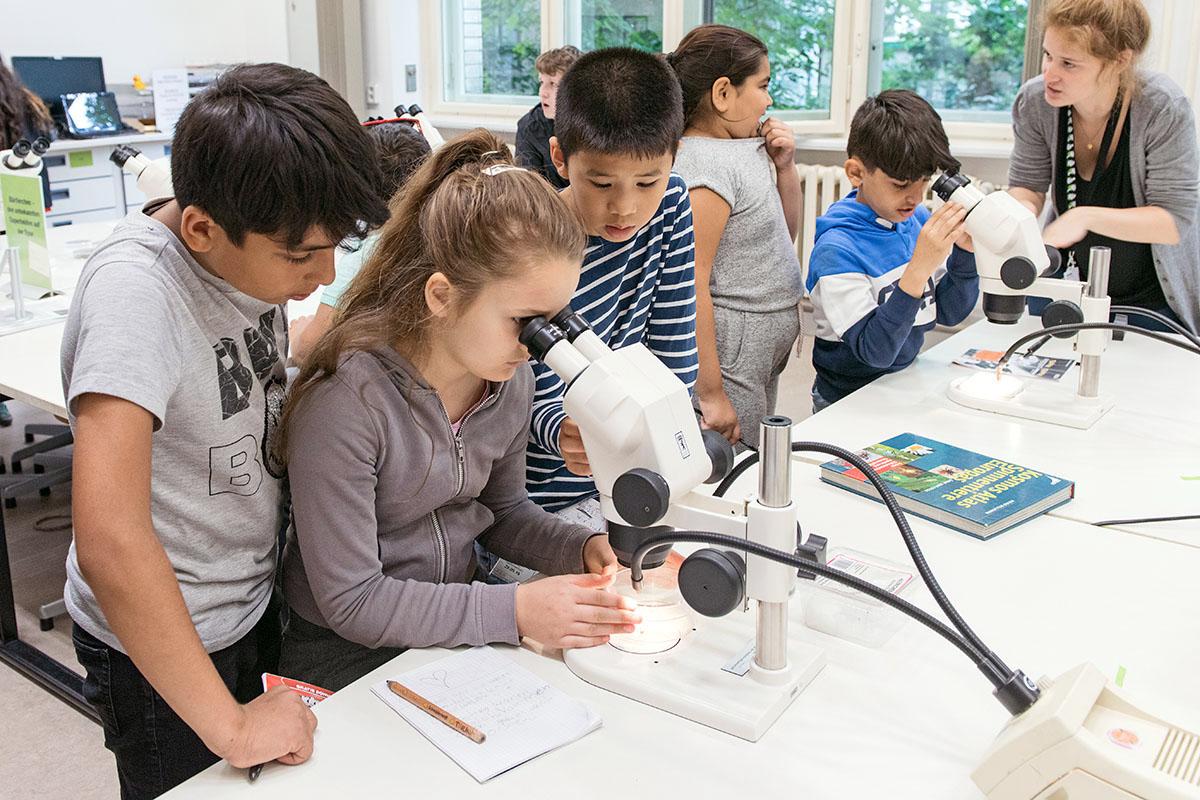Children from age 5 and teenagers of all class levels can explore the world of science in workshops and microscopy classes. Unless otherwise stated, prices do not include admission.
Nature & art – guided tour and making masks
In the dinosaur hall, the children get to know the over 13-metre-high Giraffatitan and many other dinosaurs, such as carnivore Allosaurus or the spine-studded Kentrosaurus. After the tour, the children make dinosaur masks so that they can act out being a dinosaur.
- Participants: children from age 5 to 8
- Cost: in German €3.00, in English €4.00 per person for 90 min
Nature & art – guided tour and fossil-casting
What are fossils and how were they formed? This guided tour introduces children to unusual animals such as ammonites, trilobites, as well as dinosaurs and pterosaurs. After the tour, they can make their own plaster cast of an original fossil.
- Participants: children from age 8 to 10
- Cost: in German €3.00, in English €4.00 per person for 90 min
Journey into the Past – a Project about Fossils and Dinosaurs
This school project teaches pupils interesting facts about dinosaurs, fossils and the methods used by palaeontologists. They take part in an "excavation" and take a cast of a fossil.
- Participants: children from age 8 to 11, max. 20 people
- Cost: in German €5.00, in English €6.00 per person for 90 min
Workshop for Schools "Protection of Species"
When customs officers check the luggage of tourists in our airports, they still find many souvenirs that come from endangered species and must be confiscated. In this workshop, pupils from age 13 learn which species are most frequently affected and why they must be protected. This is followed by a role play where pupils play the parts of tourists and customs officers to demonstrate their newly acquired knowledge of species protection. The project makes use of the WWF Conservation Suitcase.
- Participants: children and teenagers age 12 to 14, max. 30 people
- Cost: €6.00 per person for 100–120 min (only in German)
Workshop "Human Evolution"
The evolution of humans has a particular fascination for most people. The tree of life of humans is redrawn nearly every year. In this workshop, pupils compare the casts of skulls of various representatives of the genera Australopithecus and Homo and learn to recognise the characteristics by which they differ. The course includes an approximately 30-minute introduction to the evolution of humans. The course is suitable as an introduction to the topic, but also offers advanced learners new in-depth content.
- Participants: teenagers from age 15, max. 30 people
- Cost: €6.00 for 120 min (only in German)
- Please let us know at the time of booking what previous knowledge of the topic the pupils have.
Programmes at the Microscopy Centre
At the Microscopy Centre, school children can learn how a microscope works and examine small and tiny creatures from Berlin's soils and waters. At the same time, they familiarise themselves with scientific research methods. The Microscopy Centre is member of Schülerlabor-Netzwerk GenaU (Learning laboratories network GenaU).
Introduction to Microscopy
Working together with pupils, the components and function of a microscope will be experienced and explained. Starting with an own hair, later on living water fleas will be examined. This course is particularly suitable for classes that have no or very little experience in using a microscope. In the end each participant will receive a microscope "driving" license as a certificate of the newly acquired skills.
- Participants: children from age 10 and teenagers
- Cost: in German €5.00, in English €6.00 per person for 90 min
Further microscopy courses at the Microscopy Centre
Pupils' working group of the Hagenbeck School
Every two weeks, two pupils' working groups of the Hagenbeck School in Pankow meet in the museum's Microscopy Centre. Together with Esther Eichenauer, a teacher at this school and a delegated teacher at the Museum für Naturkunde, the young people from the 9th grade develop independent projects on the topic of biological diversity. They try out existing and new microscopy courses, explore the exhibitions and exchange ideas with museum staff during visits to the collections, research and preparation laboratories. In this way, the pupils get to know different professional fields at the museum and gain insights into the way of working at a research museum.
Cooperative Projects with Partner Schools and Universities
The Microscopy Centre was founded by nine committed scientists from the Museum in 2006. Over the years, many more scientists have taken part in its programmes. In cooperation with school teachers, they develop microscopy classes and projects on biology, mineralogy and meteorite research.
The Microscopy Centre offers not only classes for pupils, but also trainings for teachers. Block seminars on flower biology and nutrition that are held half-yearly in the Microscopy Centre have become an integral part of teacher training at the University of Potsdam.
